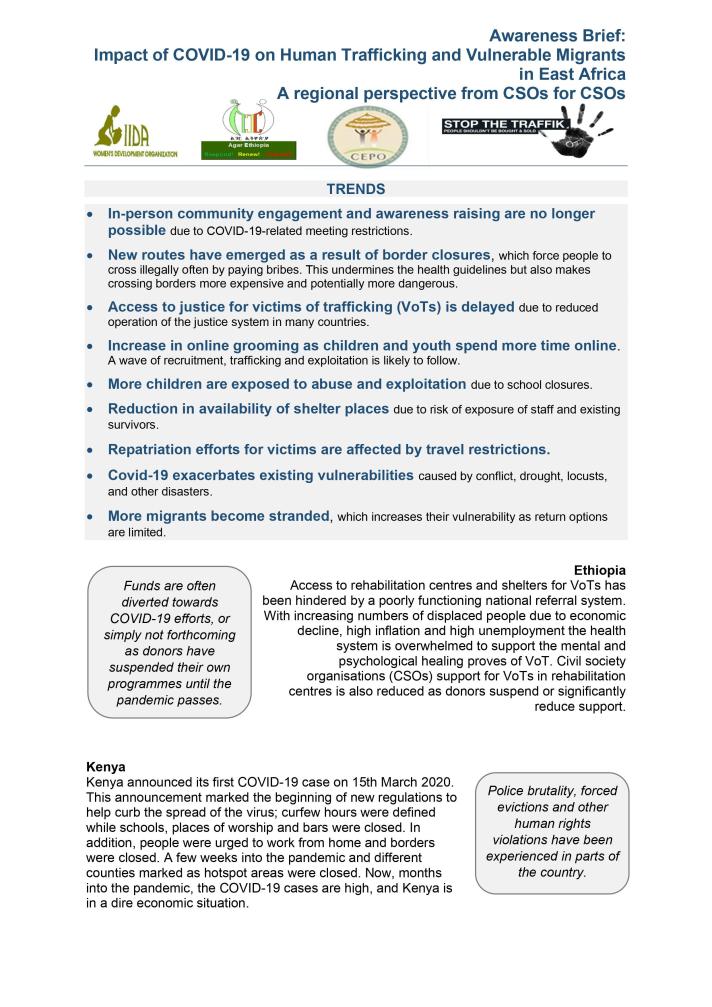
Due to border closures and public hygiene measures, COVID-19 has a deep impact on the population as a whole, and especially on the most vulnerable populations, such as migrants. Due to closed borders, some migrants are stranded and others are looking for other possibilities to leave or enter a country. A wave of human trafficking is likely to follow. ‘Vulnerabilities have deepened in the wake of COVID-19, especially for informal workers and migrants. They are more exposed to violence, trafficking, sexual abuse and exploitation than ever,’ said Smita Nagi from the Somali civil society organization IIDA.
With support from the Better Migration Management Programme, the regional anti-trafficking civil society organisations (CSOs) network published an awareness brief on social media under the hashtag #COVID19AffectsMigrants on the effects of the pandemic on human trafficking and on vulnerable migrants in the Horn of Africa. ‘COVID-19 has two effects: It really restricts the activities we as CSOs can do to protect vulnerable populations and prevent them from being trafficked. But COVID-19 also boosts the business model of traffickers and smugglers. People are becoming more desperate and there is higher demand for people to cross the borders, which often is not possible anymore through legal means. Many traffickers have deep pockets and can continue to cross porous borders easily. This is particularly true where institutions are weak’, explains William Lukudu from the CSO CEPO in South Sudan.
The awareness brief also displays how CSO have adapted to the crisis. The initiative of the Somali CSO IIDA to advocate for the Sexual Offences Bill in Somalia is a good example. The bill aims to criminalize a wide range of forms of gender-based violence including sex trafficking and child marriages. It faced many obstacles in parliament and criticism in general. For two years, IIDA had been advocating for the bill with members of the Somali parliament and began to collect signatures from ordinary citizens to show public support when COVID-19 hit Somalia. Unable to continue collecting signatures in person, IIDA moved their advocacy work online and started an online signature petition in July 2020. They have collected 90,000 signatures so far. This innovative method of gathering support has been captured in the CSO Awareness Briefing. ‘Be open to new opportunities and embrace digital civic engagement opportunities and digital platforms,’ the recommendation reads.
Under the initiative of Smita Nagi from IIDA, CSOs shared their experiences and captured emerging regional trends and recommendations. ‘The Awareness Briefing has been prepared by organisations from different countries in the region. Over several months, every one of us provided a snapshot of the situation in their country. This made it possible for us to borrow good ideas and initiatives from each other that can have a positive impact. We can learn a lot from each other on how to protect vulnerable populations in times of COVID-19,’ said William Lukudu. The CSOs shared their information on current regional migration trends, the situation in each country and the recommendations on Twitter under #COVID-19AffectsMigrants.
The Regional CSO Network was initiated in 2017 and is facilitated by the Better Migration Management programme, funded by the EU and Germany. The programme aims to improve safe, orderly and regular migration. Due to the pandemic the programme transformed the annual Regional CSO Forum on Safe and Fair Migration, usually held each July, into a series of virtual sessions and workshops to continue supporting the network throughout 2020. The Regional Anti-Trafficking CSO Network has grown to include 63 organisations in 7 countries in the Horn of Africa, all of them working on anti-trafficking in human beings.
Details
- Publication date
- 22 October 2020
- Region and Country
- Horn of Africa
- Thematic
- Improved migration management
- Partner
- GIZ


